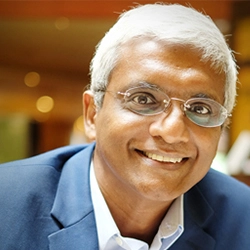Date
8 - 11 April 2025
Location
London
8 - 11 April 2025
London
As banks and new financial institutions scale talented individuals into management positions, some from outside the industry, there is a need to equip them with an intuitive understanding of all of the disciplines of the industry. All levels of decision making in the banking today demand a high level of industry and broad knowledge and skills at a global level, no matter how small the institution.
The International Bank Leadership Programme was developed by The Banking Academy over several years to demands from banks that want to scale their promising executives and even board members in order to respond to new challenges as they arise.
The programme features intense learning with deep content, but more importantly, mentorship from a faculty of practitioners and industry thought leaders. The year long programme is structured around a weeklong in-campus training, followed by tactical sessions conducted online and a one-year membership access to new content and discussions as they develop, supporting both technical as well as leadership skills of participants.
This programme is global in its orientation, and includes a library of case studies and best practices that will give your executives a clear confidence in building their own world class institutions in the course of their careers.

Highly promising management at both entry and mid-career levels who need to be scaled up to a strategic level on all aspects of the industry and supplement the organisation-specific training that they already receive.



Promising leaders transitioning to strategic roles, building on their existing training.
Executives involved in strategic planning, benchmarking, GAP analysis, and scenario planning.
Individuals from other industries needing an introduction to banking for informed decision-making.
Investors and professionals seeking insights to assess financial institutions for M&A, IPOs, and other initiatives.

Promising leaders transitioning to strategic roles, building on their existing training.
.png)
Executives involved in strategic planning, benchmarking, GAP analysis, and scenario planning.

Individuals from other industries needing an introduction to banking for informed decision-making.

Investors and professionals seeking insights to assess financial institutions for M&A, IPOs, and other initiatives.
We will cover the following areas in the programme both during the onsite and through tactical sessions over the course of one year:
We will cover the following areas in the programme both during the onsite and through tactical sessions over the course of one year:
Participants can expect to gain the following skills and experiences through this programme:



Participants can expect to gain the following skills and experiences through this programme:

Deep understanding of industry trends and competitive dynamics.

Mastery of commercial banking metrics, including balance sheets and benchmarks.

Update on key areas like treasury, risk management, technology, and HR.

Evaluate your institution against global best practices.

Connect with peers from around the world.
13.png)
Ready yourself for leadership roles within your organisation.
The features of this programme are clearly targeted at senior decision makers:
.png)
Continuously updated with the latest industry developments.
1.png)
Covers key institutions, trends, and developments worldwide.
2.png)
Provides a comprehensive understanding of critical issues.
3.png)
Offers precise metrics for key operational areas.

Trainers also serve as mentors.

Includes simulation exercises for practical experience.

Access to primary reading and course resources for future reference.
Tailored to incorporate your institution's structure.
Before the in-campus week in London, participants will:
The programme starts with an intensive week in London, where faculty and invited speakers will provide a comprehensive industry overview, laying the groundwork for the tactical sessions that follow.
Please note that the entire orientation of this training is to train the participants to rehearse some of the decision-making challenges they will face as their banks become increasingly more digital (including AI) and are also faced with new asset classes on their balance sheet.
09:00
We will start with an introduction of:
Some of the introductions and feedback would have already started in the chat groups.
10:00
Following introductions, we begin the programme with a wide-ranging overview of global developments—geopolitics, regulation, the platform economy, emerging technologies, and digital assets—that are reshaping financial services.
This session helps participants anchor their thinking in the context of long-term trends, offering a strategic lens through which to interpret today’s developments. It introduces the broader universe of issues a CEO or board-level leader must be mindful of—setting the foundation for informed, forward-looking decision-making throughout the programme.
11:00
This session lays the foundation for the simulation programme by examining how digital transformation—and now artificial intelligence—is reshaping the way we understand and manage the bank’s balance sheet.
We begin by appreciating how the elements of a banking business are captured on the balance sheet, and how digital banking has already transformed this structure.
The session will include three key segments:
1. Financial scorecard and leading indicators
We start with a review of leading indicators such as cost-to-income, ROE, cross-sell, and other key ratios that define high-performing institutions. Participants will be introduced to a scorecard approach that enables a holistic view of the bank's financial performance. This includes digesting the profit and loss statement of a traditional bank and studying balance sheet items used by leading institutions to benchmark performance.
2. From digital to AI banking
We explore how digital banking has evolved globally, setting the stage for how AI will further redefine the industry. We will take a detailed look at how the balance sheet of a bank like DBS transformed as it transitioned from a traditional bank to a digital leader, and what this implies for the next phase of AI banking.
3. Mapping the full banking landscape
We build a comprehensive view of how the balance sheet connects with treasury, operations, technology, customer relationship management, human resources, operational risk, and product design. This includes studying digital banks, fintech platforms, and payment providers to identify the structural benchmarks and metrics that matter when assessing new disruptors in the industry.
The session concludes with a discussion of case studies of banks that demonstrate exceptional performance, helping participants identify the matrix they should aspire to develop within their own institutions.
11:00
This session lays the foundation for the simulation programme by examining how digital transformation—and now artificial intelligence—is reshaping the way we understand and manage the bank’s balance sheet.
We begin by appreciating how the elements of a banking business are captured on the balance sheet, and how digital banking has already transformed this structure.
The session will include three key segments:
1. Financial scorecard and leading indicators
We start with a review of leading indicators such as cost-to-income, ROE, cross-sell, and other key ratios that define high-performing institutions. Participants will be introduced to a scorecard approach that enables a holistic view of the bank's financial performance. This includes digesting the profit and loss statement of a traditional bank and studying balance sheet items used by leading institutions to benchmark performance.
2. From digital to AI banking
We explore how digital banking has evolved globally, setting the stage for how AI will further redefine the industry. We will take a detailed look at how the balance sheet of a bank like DBS transformed as it transitioned from a traditional bank to a digital leader, and what this implies for the next phase of AI banking.
3. Mapping the full banking landscape
We build a comprehensive view of how the balance sheet connects with treasury, operations, technology, customer relationship management, human resources, operational risk, and product design. This includes studying digital banks, fintech platforms, and payment providers to identify the structural benchmarks and metrics that matter when assessing new disruptors in the industry.
The session concludes with a discussion of case studies of banks that demonstrate exceptional performance, helping participants identify the matrix they should aspire to develop within their own institutions.
14:00
This session marks the beginning of a series of simulation exercises designed to help participants build instinct in managing a bank’s balance sheet—recognising that banking, at its core, is a balance sheet business.
We will use the ProBanker Simulation, originally developed by Professor Mark Flood at Wharton, to replicate a banking environment where participants must make decisions to gain market share, maximise profitability, minimise risk and manage capital, all within a competitive and regulated framework.
The simulation provides an experiential platform to test and refine participants’ decision-making instincts, allowing for structured reflection and group discussion on the choices made and their outcomes. The goal is to develop sharper judgement under dynamic market conditions.
15:00
Understanding how financial institutions are funded and supported by shareholders provides insight into the strategic directions they are able to pursue. At the same time, a key responsibility of senior leaders is to effectively communicate financial goals and value creation strategies to shareholders.
This session explores how different players—including digital banks, BNPL firms, and payment platforms—build their business models and shape their shareholder narratives through the structure and performance of their balance sheets.
We will examine case studies such as Revolut and Wise, which have emerged as serious challengers to traditional banks in the payments space. The BNPL segment will be covered through both success stories like Klarna and failures including Affirm (Australia), ZestMoney (India), and Cushion (US). We will also study a traditional bank example—Secure Trust Bank’s V12 partnership with Apptopay—to understand collaboration models between legacy players and fintechs.
The session will also touch on the rollout of Open Banking across global markets and how it is influencing shareholder strategies and institutional positioning.
16:30
This session focuses on the evolving nature of Enterprise Risk Management (ERM) in the age of AI. Participants will explore how senior management and board-level leaders must adopt a more holistic approach to setting ERM parameters as digital transformation reshapes the banking environment.
We will examine how culture, reporting lines, and internal interactions have shifted in digital banks, and how these changes are redefining ERM frameworks. The session will draw from recent ERM failures to highlight critical lessons in oversight, governance, and accountability.
With the rise of AI, participants will also consider new and emerging risk scenarios—particularly those requiring stress testing against adverse outcomes—to build forward-looking and adaptive risk frameworks.
16:30
This session focuses on the evolving nature of Enterprise Risk Management (ERM) in the age of AI. Participants will explore how senior management and board-level leaders must adopt a more holistic approach to setting ERM parameters as digital transformation reshapes the banking environment.
We will examine how culture, reporting lines, and internal interactions have shifted in digital banks, and how these changes are redefining ERM frameworks. The session will draw from recent ERM failures to highlight critical lessons in oversight, governance, and accountability.
With the rise of AI, participants will also consider new and emerging risk scenarios—particularly those requiring stress testing against adverse outcomes—to build forward-looking and adaptive risk frameworks.
Dinner
On Day Two, we will visit local banks and fintechs to understand their organisation and value propositions. The names below are subject to confirmation, but the final list will be of similar quality and depth.
09:00
Retail and SME banking remain core pillars for most financial institutions, yet both are being redefined by Open Banking frameworks and innovative approaches to serving entrepreneurs and small businesses.
In this session, participants will engage with two distinguished guest speakers who bring first-hand insights from the forefront of these transformations: Open Banking as a catalyst for market-wide change, and relationship-driven models that empower SMEs in the digital age.
11:00
OakNorth is one of the UK’s most successful fintech banks, focused on transforming credit access for fast-growing SMEs. Since 2015, it has lent over £12 billion, helping create more than 56,000 jobs and 34,000 homes across the UK.
Built by entrepreneurs for entrepreneurs, OakNorth stands out for its AI-powered platforms—ONAI and ONCI—that use alternative data, machine learning, and predictive analytics to assess creditworthiness beyond traditional models. The result: bespoke lending decisions, faster turnaround times, and low loan defaults to date.
Key Learning Points:
Followed by a working lunch.
11:00
OakNorth is one of the UK’s most successful fintech banks, focused on transforming credit access for fast-growing SMEs. Since 2015, it has lent over £12 billion, helping create more than 56,000 jobs and 34,000 homes across the UK.
Built by entrepreneurs for entrepreneurs, OakNorth stands out for its AI-powered platforms—ONAI and ONCI—that use alternative data, machine learning, and predictive analytics to assess creditworthiness beyond traditional models. The result: bespoke lending decisions, faster turnaround times, and low loan defaults to date.
Key Learning Points:
Followed by a working lunch.
14:00
This session addresses the critical aspects of developing a robust IT strategy in the context of AI-driven digital transformation. As banks rethink their technology foundations, the discussion will centre on aligning infrastructure with future needs while maintaining operational stability.
Key focus areas include:
Participants will review the latest vendor propositions and examine the industry's ongoing shift from mainframes to cloud-based platforms.
The session also delves into the use of open-source computing, APIs, and user-developed applications, and how these innovations are reshaping financial services.
Finally, we address how banks can structure their organisations to harness the speed and agility required by digital banking, enabling retail, SME, and wealth management businesses to operate on a unified, scalable infrastructure.
15:30
In this session, participants will be introduced to the competitive simulation through two structured trial runs. Teams will be assigned and asked to input decisions across a range of variables—including deposit and loan rates, wholesale deposits, reserve requirements, loan loss allowances, and marketing allocations.
Following the first quarter, teams will review the performance reports, analyse outcomes, and discuss strategy with team members and instructors. Revised decisions will then be submitted for the second quarter, concluding with a brief analysis of the updated results.
15:30
In this session, participants will be introduced to the competitive simulation through two structured trial runs. Teams will be assigned and asked to input decisions across a range of variables—including deposit and loan rates, wholesale deposits, reserve requirements, loan loss allowances, and marketing allocations.
Following the first quarter, teams will review the performance reports, analyse outcomes, and discuss strategy with team members and instructors. Revised decisions will then be submitted for the second quarter, concluding with a brief analysis of the updated results.
After the week in the UK, this programme will go entirely digital and online, giving each participant an annual membership to periodic, very tactical sessions as stated below.
The programme is anchored and delivered by some of the most experienced professionals in the industry.



.png)



US $18000
* Excludes airfare, visa fees, and airport transfers during the week in London.